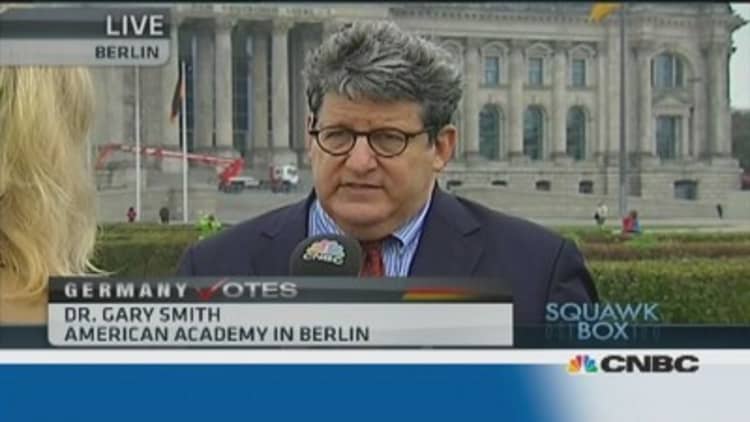With just days to go until Germans head to the polls, the likelihood of Chancellor Angela Merkel retaining her crown grows ever larger. But Germany's establishment could still be in for a shock.
On Thursday, the anti-euro Alternative fur Deutschland (AfD) hit the 5 percent threshold for the first time that parties need to gain a seat in parliament, according to an INSA poll. The poll suggested Merkel may not be able to re-form her center-right coalition with the liberal FDP.
The poll gave Merkel's CDU/CSU coalition 38 percent of the vote, while the FDP got 6 percent. Their combined 44 percent would not give them a majority in parliament.
Twenty-eight percent of the vote went to the social democrat SPD led by Merkel's main challenger, Peer Steinbrueck.
(Read more: How does Germany's electoral system work?)
The straight-talking Steinbrueck raised eyebrows earlier this week when he appeared on the cover of Süddeutsche Zeitung magazine making an obscene gesture. The magazine published one of its regular photo "interviews", showing the SPD candidate in a series of poses. In one of them he raised his middle finger when asked how he felt about some of the nicknames he had acquired, including "Peerlusconi".

(Read more: Berlusconi to stay in politics despite criminal conviction)
"There was never any question that Chancellor Merkel would be elected. It's just a question of who she would govern with. And this makes it pretty clear that there will be a grand coalition," Gary Smith, executive director of the American Academy in Berlin, told CNBC.
"It's clear that this anti-European, anti-EU protest party is going to gain significantly. I think they're going to be significantly over 5 percent," he said.
Led by former financial journalist, Roland Klaus, the AfD opposes further aid for heavily indebted countries such as Greece. Although the party is pro-EU and supports the idea of free trade and the free movement of workers across the union, it believes the EU is now "growing like a cancer". It wants to repatriate decision-making from Brussels to member states, and wants to abolish the euro.
The party offers an alternative to Germans , and are disillusioned with Merkel's Christian Democrat party, which has moved towards the center of the political spectrum.
If the AfD makes it into parliament and the current liberal coalition partners don't, the party could prove a headache for Merkel. She will be faced with tough talks to form a new "grand" coalition and would have to join forces with Steinbrueck's SPD.
"In the Bundestag, you'll have a fairly articulate voice that you didn't have (before) for conservative values," Smith said.
Follow us on Twitter: @CNBCWorld

